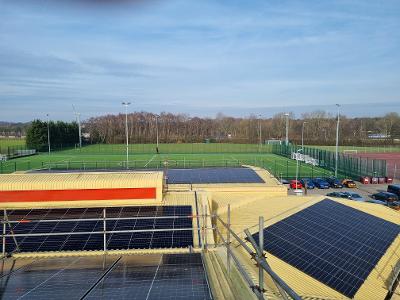Solar power to provide clean energy to council leisure centres
Solar power and energy efficiencies are being harnessed at key public buildings, helping to reduce energy costs and the carbon footprint of local services as part of St Helens Borough Council's Climate Action Plan.

Article date: 25 February 2025
The move supports the council's aspirational goal of reaching net-zero emissions by 2040 - describing a balance between the amount of harmful greenhouse gases produced and removed from the atmosphere.
Work is being finalised at Newton-le-Willows Health & Fitness, where rooftop solar panels have been fitted and connected to the grid, providing the leisure centre with cheaper and cleaner energy - funded by the Liverpool City Region's Public Sector Decarbonisation Scheme.
The scheme is expected to reduce the centre's energy bills by £42,457 per year and reduce annual carbon emissions by 47.88 tonnes of CO2e. The council has also secured £224,807 of Sport England Funding to install solar panels at Queens Park Health & Fitness, which will provide similar savings.
Elsewhere the council has received an additional £1,131,922 funding from the Public Sector Decarbonisation Scheme to undertake carbon-reduction works at Earlestown Town Hall as part of the historic building's refit. This will include modern insulation, efficient LED lighting and lighting controls, and an upgraded electricity supply to accommodate air source heat pumps. These improvements will improve energy efficiency considerably, with estimated annual savings of £3,670 and 38 tonnes of CO2e.
"It's great to see further progress made on our extensive actions to reduce our impact on the environment here in the borough, alongside separate schemes like our fleet modernisation and LED street lighting rollout.
"All these changes to the fabric of our buildings will be complemented by a new upgraded building management system, granting remote control of the temperature and energy use in council buildings, helping to reduce costs and carbon emissions.
"And we're hopeful that a bid for further funding from the next round of the Liverpool City Region's Public Sector Decarbonisation Scheme will be just as successful, allowing us to deliver additional decarbonisation projects in other council buildings."




